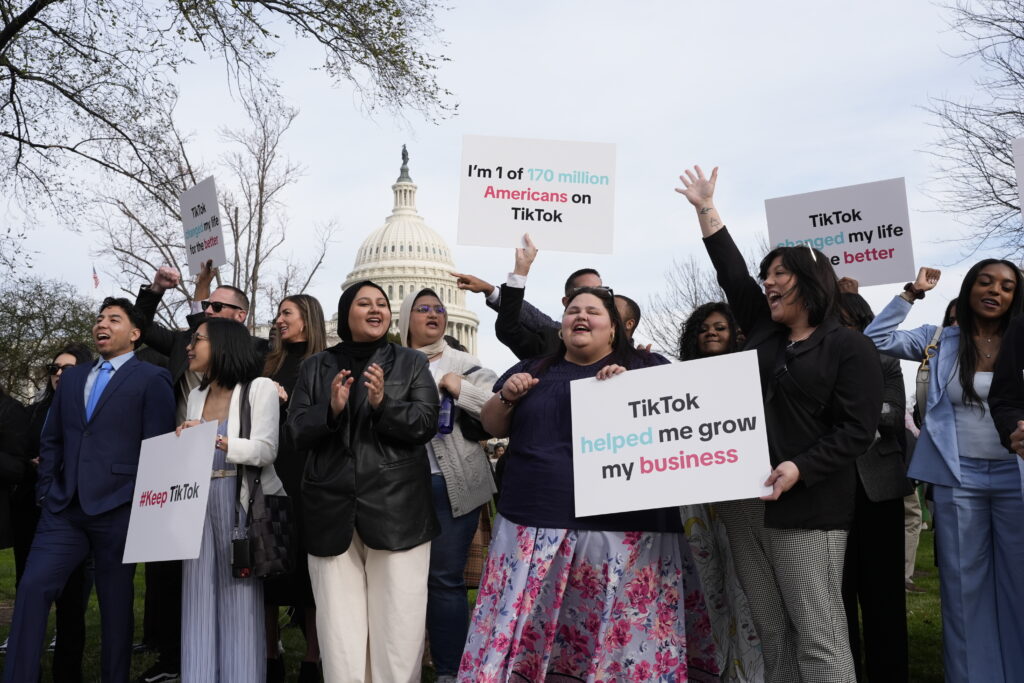Here are three things that are simultaneously true. One, there is no more serious threat to freedom in the world than the present Chinese regime. Two, TikTok can turn people’s minds into susceptible mush. Three, Congress is making a mistake by forcing TikTok’s Chinese owners sell their U.S. operation under threat of closure.
Let’s consider those three propositions in turn. When I describe China as a threat to freedom, I don’t simply mean that it is a strategic adversary like Russia or Iran. I mean that it has developed a societal model that is both inimical to personal liberty and capable of being exported.
Since 2012, China has used cutting-edge technology to create a terrifying panopticon state. Face recognition and geolocation allow for a measure of control that no previous tyranny could have imagined. Notionally private firms such as Weibo, Tencent, and Alibaba employ both propagandists and spies for the regime. A state-controlled digital currency is the next step, allowing the government to punish thoughtcrime with automatic fines. These things are not just a tragedy for the Chinese people. They are a ready-made totalitarian machine available to any would-be tyrant looking for alternatives to Western democracy.

As for TikTok, it is transforming an entire generation into credulous half-wits. Ever since smartphones came in, there has been a shrinking of attention spans. We can measure it in all sorts of ways. Newspaper articles are shorter; pop songs are simpler and more repetitive; people are even walking faster. But nothing represents our distractedness more aptly than the bottomless scrolling of TikTok. It is not going too far to attribute America’s political breakdown, and the mandatory lies about the 2020 election, to the disorientation and gullibility that flows from screen addiction.
If a dangerous regime owns an app that is deleterious to Americans’ mental health, does it not make sense to ban it? That was the view taken by the House of Representatives last month, when it voted by 352 to 65 to force TikTok’s Chinese parent company to sell the social media platform to a U.S. firm or halt its operations.
But there is a world of difference between disapproving of something and banning it. Understanding that difference is what we mean by living in an open society.
There are plenty of good reasons to keep TikTok off your children’s phones. Indeed, I am increasingly drawn to Jonathan Haidt’s argument that children shouldn’t have smartphones at all, and would be delighted to see more schools keeping electronic narcotics off their premises.
That, though, is very different from using the full coercive force of government. Laws are blunt instruments that inevitably have unintended consequences. The law being pushed by the House is a classic example. It defines certain states as adversaries, but has great difficulty when it comes to laying down what counts as being “controlled” by such a state:
- a foreign person that is domiciled in, is headquartered in, has its principal place of business in, or is organized under the laws of a foreign adversary country;
- an entity with respect to which a foreign person or combination of foreign persons described in subparagraph (A) directly or indirectly own at least a 20 percent stake; or
- a person subject to the direction or control of a foreign person or entity described in subparagraph (A) or (B).
The reason for these verbal gymnastics is that it is far from clear that TikTok is, in any meaningful sense, a “Chinese app.” It is owned by TikTok LLC, a limited liability company incorporated in Delaware and based in Culver City, California. The LLC is in turn controlled by TikTok Ltd, which is registered in the Cayman Islands and based in Los Angeles and Singapore. Around 60% of TikTok Ltd’s shares are owned by international investors, many of them Americans. Its CEO is Singaporean. Indeed, TikTok doesn’t even exist in China, which instead uses a local equivalent called Douyin.
CLICK HERE TO READ MORE FROM THE WASHINGTON EXAMINER
So who is pressing for the ban? U.S. firms that see an opportunity to snap up TikTok’s American assets in a fire sale. Foreign policy hawks who stop thinking critically when they hear the word “China.” Conservatives who dislike the fact that TikTok, reflecting the preferences of its young users, circulates pro-Palestinian content. And, not least, protectionists who oppose all foreign investment in the U.S., whether by TikTok or Nippon Steel.
But reread that clumsy paragraph from the draft law. Its effect would be to increase state control over all internet platforms, not just TikTok. Is that really a proportionate reaction? Surely the worst possible response to Chinese authoritarianism is to embrace American authoritarianism.

